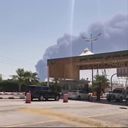Yemen's Houthi rebels claim drone strikes on Saudi oil facilities. The U.S. blames Iran.

Published Date: 9/15/2019
Source: axios.com
Iran denied Sunday U.S. accusations that it was behind drone attacks targeting the world's largest oil processing facility at Abqaiq and a major oil field at Khurais in Saudi Arabia the previous day.The latest: Yemen's Iranian-backed Houthi rebels claimed responsibility for the early Saturday strikes, AP reports. But U.S. Secretary of State Mike Pompeo blamed Iran, saying "there is no evidence the attacks came from Yemen." Iranian Foreign Ministry spokesperson Abbas Mousavi said in a statement the U.S. accusations were "blind, incomprehensible and meaningless."We call on all nations to publicly and unequivocally condemn Iran’s attacks. The United States will work with our partners and allies to ensure that energy markets remain well supplied and Iran is held accountable for its aggression— Secretary Pompeo (@SecPompeo) September 14, 2019
Why it matters: The attacks cut crude oil output by 5.7 million barrels a day, the state-owned oil giant Saudi Aramco said. Saudi Arabia estimates that's about half of the country's oil production — roughly 5% of the world's daily crude oil output, per the Wall Street Journal. Where it stands: The strikes were the largest attacks on "Saudi Arabia's oil infrastructure in more than a decade," Bloomberg reports. The energy minister said Saudi Aramco is "working to recover the lost quantities." Saudi Aramco executives held an emergency meeting to determine the damage, per Bloomberg.The plant, which burst into flames, is "crucial to global energy supplies," per AP. The New York Times notes it's unclear where the drones were launched from, and how the Houthis managed to hit facilities deep in Saudi territory, some 500 miles from Yemeni soil.Our thought bubble, per Axios' Ben Geman: The attack is likely to push oil prices upward, perhaps significantly so, owing to concern about geopolitical risk — even if, as the Wall Street Journal reports, production is quickly restored and overall Saudi supplies to global markets aren’t disrupted.What they're saying: President Trump and Saudi Crown Prince Mohammed bin Salman spoke on the phone Saturday, with Trump offering "his support for Saudi Arabia's self-defense," according to deputy White House press secretary Judd Deere.Saudi media reported that the crown prince told Trump, "The kingdom is willing and able to confront and deal with this terrorist aggression."Deere said Trump declared, "Violent actions against civilian areas and infrastructure vital to the global economy only deepen conflict and mistrust." The U.S. "remains committed to ensuring global oil markets are stable and well supplied," he added.The big picture: With tensions heightened between the U.S. and Iran, and across the Persian Gulf between Saudi Arabia and Iran —there's a potential "risk to global oil supply," Bloomberg writes.The Houthi rebels have been fighting the Saudi-backed central government for years in a war that's led to the one of the world's worst humanitarian crises.In January, United Nations investigators wrote that the Houthis had acquired advanced drones that could have a range of up to 930 miles, NYT reports.Saudi Aramco was reviving preparations for a massive IPO when the attacks happened.Go deeper: Saudi Aramco replaces chairman as oil giant prepares for massive IPO Editor's note: This article has been updated with new details throughout.